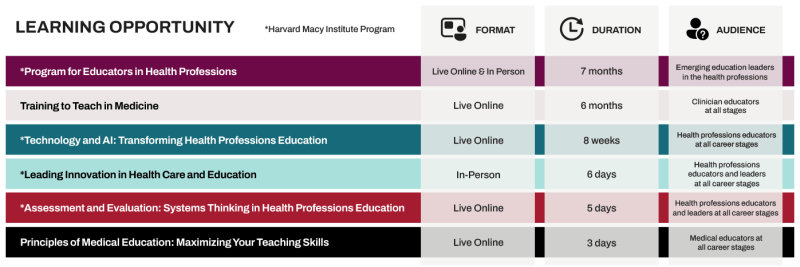Shaping the Future of Medical Education: Innovation, Leadership, and Lifelong Learning
Medical education is evolving from lectures to learner-centered, tech-driven, lifelong learning. Harvard programs reflect this shift with flexible, innovative training.

Over the past several decades, medical education curricula have undergone significant transformation to address the increasing complexity of today’s health care landscape. Traditionally rooted in didactic lectures and strictly in-person formats, educational programs have evolved to embrace more learner-centered, interdisciplinary, and technology-enhanced approaches. Simulation-based training, interprofessional collaboration, and case studies are now foundational elements.
There has been a surge in faculty and professional development offerings tailored to postgraduate health care professions—such as certificate programs, short courses, and online modules—designed to help clinicians, educators, and health leaders expand their skill sets while continuing their practice. This shift reflects a broader recognition that learning in the health professions is lifelong and must adapt to the rapidly changing needs of patients, systems, and science, particularly in the era of artificial intelligence.
Looking ahead, the future of medical education will lean into greater flexibility and innovation. AI, data analytics, and personalized learning will increasingly shape course design, delivery, and assessment. Emerging technologies like virtual reality, simulation, and digital assessment tools will further enhance skill development and competency evaluation. There will be a stronger emphasis on competency-based outcomes, patient-centered care, and global health perspectives, ensuring that health care professionals are equipped to lead in a more interdisciplinary, technology-enhanced, and dynamic world.
Institutions are also moving toward more integrated curricula that combine clinical excellence with leadership, innovation, and systems thinking. For professionals seeking to deepen their expertise or pivot into new areas of impact, the next generation of faculty development programs for medical educators will offer not only essential knowledge but also the transformative skills needed to thrive in the future of health care.
Harvard Medical School’s faculty development offerings are continually evolving to meet the changing needs of health professionals and educators. Our diverse portfolio of programs is thoughtfully designed to accommodate a wide range of preferences—offering flexibility in format, duration, cost, and delivery to support lifelong learning and career advancement at every professional stage.

Overview of HMS Medical & Health Professions Education Offerings:
The Harvard Macy Institute’s Program for Educators in Health Professions is a seven-month, hybrid (live online and in-person) professional development experience tailored to develop leadership and advanced educational skills for aspiring and emerging leaders in the health professions education. With a strong foundation in educator competencies, this program empowers health care professionals to thrive as effective teachers, adaptive leaders, and innovative change agents in dynamic clinical and academic settings. Participants engage in extended, mentored learning, including self-reflection, collaborative small group work, and the design and implementation of impactful educational projects, positioning graduates for ongoing career advancement and institutional leadership. A vibrant community and network of alumni continue to collaborate long after the program concludes.
Training to Teach in Medicine is a six-month, fully online certificate program crafted with clinician educators in mind – from early career to experienced practitioners, seeking practical, evidence-based skills to immediately enhance their teaching effectiveness in both academic and clinical settings. The curriculum blends adult learning theory with cutting-edge approaches to instructional design, interactive teaching, and learner assessment. Through live virtual workshops, synchronous teaching simulations, and personalized faculty feedback, participants will gain practical tools to build inclusive and dynamic learning environments. A hands-on capstone project anchors the program, allowing participants to apply their learning to a real-world educational challenge or initiative within their own institution. Graduates emerge ready to strengthen teaching and learning, mentor peers, and inspire students in every care setting.
Technology and AI: Transforming Health Professions Education is an eight-week, highly interactive online experience, meeting twice-weekly for two hours, targeted to health professions educators who want to lead digital transformation in their educational setting. This Harvard Macy Institute course uniquely empowers educators to integrate cutting-edge technologies —including generative AI—into teaching, learning, assessment, and leadership. Participants benefit from immersive and hands-on learning with peers and expert faculty, gaining actionable strategies, frameworks, and tools to enhance student engagement and collaboration across varied settings. The curriculum directly addresses contemporary challenges and helps educators build confidence as digital innovators.
Leading Innovation in Health Care and Education was developed by Harvard Macy Institute leaders in collaboration with Harvard Business School faculty. This six-day, in-person program held in Boston equips educational leaders with the practical tools and fresh perspectives to navigate complexity and lead transformative initiatives within their institutions. Through hands-on learning, participants explore the principles of design thinking and apply influential business theories—such as disruptive innovation—to strategic decision-making and change management. The program combines case-method teaching, collaborative group work, and global perspectives to foster a rich, collegial learning environment that empowers educators to lead and innovate more effectively in academic and clinical settings.
The Harvard Macy Institute’s Assessment and Evaluation: Systems Thinking in Health Professions Education empowers health professions educators and leaders to drive meaningful educational change within complex organizations. Grounded in systems thinking, the curriculum equips participants with the principles and frameworks to reconceptualize assessment and evaluation as strategic tools for advancing institutional priorities and improving learner outcomes. Through dynamic interactive formats—including case discussions, hands-on workshops, and personalized faculty consultations—attendees will explore best practices in assessment, collaborate with peers, and apply new strategies to their own educational contexts. Scholars will leave with expanded expertise, ready to implement and sustain transformative improvements within their institutions.
Principles of Medical Education is a three-day, fully online, intensive virtual program, designed to support medical educators at all career stages to enhance their teaching across clinical and classroom environments. The course delivers practical, evidence-based strategies for bedside, ambulatory, and classroom teaching. Participants will explore how to integrate emerging technologies—including artificial intelligence and digital media—into their teaching, while also strengthening traditional skills, such as delivering engaging lectures, facilitating active learning in groups of all sizes, and providing meaningful feedback that motivates change. Educators will develop the tools to improve interactivity in both in-person and virtual learning, identify and mitigate bias, and enhance personal and organizational well-being. A special emphasis is placed on fostering effective mentor-mentee relationships and developing leadership skills to implement and sustain educational innovation. This highly rated program offers a rich opportunity to inspire and elevate learners across all settings.
Together, these offerings reflect Harvard Medical School’s deep commitment to advancing health professions education through innovation, technology, and leadership development. Whether your goal is to enhance your daily teaching, integrate emerging technologies such as AI, rethink assessment and evaluation, or drive strategic institutional change, these programs provide development opportunities tailored to the specific needs and aspirations of medical and health professions educators. As the health care landscape continues to evolve, Harvard Medical School stands at the forefront, preparing educators and leaders to shape the future and improve health outcomes worldwide.
